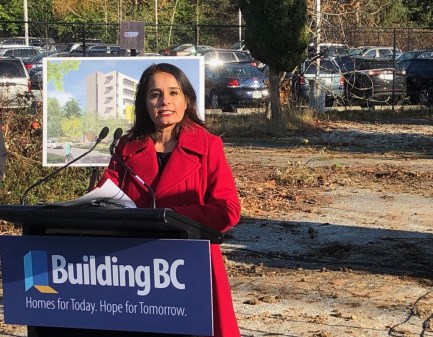The B.C. Green Party is urging the provincial government to recognize the International Decade for People of African Descent, which Black-led advocacy groups say could lead to crucial funding in support of anti-racism programs.
Recognition in B.C. could make Black-led community groups eligible for a portion of the $25 million allocated by the federal government when it recognized the international decade in 2018, said Green party leader Sonia Furstenau.
“For the Black community, it’s a recognition from the provincial government of their experiences that there is anti-Black racism in this province that isn’t being addressed in the way it needs to be addressed,” she said.
Boma Brown, founder of the Victoria-based Support Network for Indigenous Women and Women of Colour, said organizations like hers, relying heavily on volunteers, do not have the capacity to compete for large federal grants.
“Capacity building for Black-led organizations is something we really want to highlight because it’s just not happening in B.C.,” said Brown, who sits on a province-wide anti-Black racism advisory committee made up of leaders from the business, non-profit, mental health and education sectors.
The committee would like to see more funding to promote democratic engagement among Black communities, Brown said, which are significantly under-represented in the province’s elected leadership.
Proclaimed by the United Nations general assembly in 2014, the declaration acknowledges that people of African descent represent a distinct group whose human rights must be promoted and protected.
It was recognized by Ontario in 2017 and by Alberta and the federal government in 2018. The City of Victoria recognized the decade in July, creating a grant program for Black-led organizations, anti-racism training to prevent racism in city policy and hiring policies to ensure the municipal workforce reflects community diversity.
Furstenau said the recognition is particularly important in the wake of Mary Ellen Turpel-Lafond’s report on Indigenous-specific racism in B.C.’s health-care system, which also heard reports of systemic racism against other racialized people, such as Black and South Asian communities.
Furstenau is pushing for the legislature to convene an all-party committee on anti-racism that focuses on systemic racism in government institutions.
Rachna Singh, MLA for Surrey-Green Timbers and the parliamentary secretary for anti-racism initiatives, said her first priority is to consult with advocacy groups representing racialized people across B.C. to get their feedback on government policies that could address systemic discrimination.
Singh said she will speak to Black-led organizations about the International Decade for People of African Descent, but she said it’s too early in her mandate to make a decision on the issue.
Brown would also like to see the province commit to collecting data that is disaggregated by race so the provincial government knows how racialized communities are performing in education or how they are affected by the health or social welfare system.
A survey released by the B.C. government in August showed that the COVID-19 pandemic has disproportionately affected racialized people, with more than one in five Black, Latin American and West Asian respondents reporting job losses due to the pandemic.
However, the B.C. government does not collect health data broken down by race.
Singh said she is working with all government ministries to establish an Anti-Racism Act in British Columbia. This act could include a mandate to collect race-based data in B.C., said Singh, but she said she wants to consult with stakeholders first.
On Wednesday, the provincial government said part of B.C.’s economic recovery plan includes $1.9 million for anti-racism initiatives, including an anti-racism public education campaign, an expansion of the Resilience B.C. program, which provides grants to community groups for anti-racism initiatives, and increased funding for the multiculturalism grants program.
In July, in the wake of Black Lives Matter rallies around the world after the killing of George Floyd by a Minneapolis police officer, then-education minister Rob Fleming created a community roundtable to develop anti-racism education in B.C.’s K-12 curriculum.
Education Minister Jennifer Whiteside will continue to work with the roundtable and will connect with organizations such as the B.C. Black History Awareness Society to identify resources for teachers and students, the ministry said in a statement.
The ministry is working with the First Nations education steering committee and First Nations Leadership Council to co-develop an Indigenous roundtable.
Last week, the Vancouver School Board approved a course called African Descent History in British Columbia as an elective class in Grade 12.



